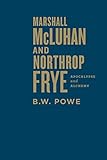Marshall McLuhan and Northrop Frye : Apocalypse and Alchemy / B.W. Powe.
Material type: TextPublisher: Toronto : University of Toronto Press, [2014]Copyright date: ©2014Description: 1 online resource (368 p.)Content type:
TextPublisher: Toronto : University of Toronto Press, [2014]Copyright date: ©2014Description: 1 online resource (368 p.)Content type: - 9781442648111
- 9781442669970
- 302.23092 23
- online - DeGruyter
| Item type | Current library | Call number | URL | Status | Notes | Barcode | |
|---|---|---|---|---|---|---|---|
 eBook
eBook
|
Biblioteca "Angelicum" Pont. Univ. S.Tommaso d'Aquino Nuvola online | online - DeGruyter (Browse shelf(Opens below)) | Online access | Not for loan (Accesso limitato) | Accesso per gli utenti autorizzati / Access for authorized users | (dgr)9781442669970 |
Frontmatter -- Contents -- Acknowledgments -- Prologue: The Juncture of Marshall McLuhan and Northrop Frye in 1946 -- 1 Intentions and Overview: Apocalypse and Alchemy in McLuhan and Frye -- 2 Presences and Signatures: These Figures in Their Ground -- 3 The Critical Conflict between McLuhan and Frye -- 4 The Harmonies in Two Seers: Orchestrations and Complementarities -- 5 Alchemy: Synergy in the Thinking of McLuhan and Frye -- 6 The Lessons of Two Teachers: Guidance and Signs -- Notes -- Bibliography -- Index
restricted access online access with authorization star
http://purl.org/coar/access_right/c_16ec
Marshall McLuhan and Northrop Frye are two of Canada’s central cultural figures, colleagues and rivals whose careers unfolded in curious harmony even as their intellectual engagement was antagonistic. Poet, novelist, essayist and philosopher B.W. Powe, who studied with both of these formidable and influential intellectuals, presents an exploration of their lives and work in Marshall McLuhan and Northrop Frye: Apocalypse and Alchemy.Powe considers the existence of a unique visionary tradition of Canadian humanism and argues that McLuhan and Frye represent fraught but complementary approaches to the study of literature and to the broader engagement with culture. Examining their eloquent but often acid responses to each other, Powe exposes the scholarly controversies and personal conflicts that erupted between them, and notably the great commonalities in their writing and biographies. Using interviews, letters, notebooks, and their published texts, Powe offers a new alchemy of their thought, in which he combines the philosophical hallmarks of McLuhan’s “The medium is the message” and Frye’s “the great code.”
Mode of access: Internet via World Wide Web.
In English.
Description based on online resource; title from PDF title page (publisher's Web site, viewed 01. Dez 2023)


